
by Lorelei Marcus
I'm convinced Star Trek is cursed. Around the same time every season, the episodes drop off in quality, going from engaging teleplays each week to bottom of the barrel Hollywood hack. Of course, the divide isn't quite so clear cut, but there is a distinctive shift as the producer runs out of his stellar front-runners and begins scrounging for TV-writer backlog to fill space.
I had hoped Season 3 would be an exception to this given its new producer and absolutely sublime first half ("Spock's Brain" notwithstanding!) but alas, the proverb remains true: the bigger they are…the harder they fall.
Now, granted, the recent decline has not been a degeneration of ideas, which often carry promise and interest, but their clumsy and contradictory execution. We as the audience are baited in on hooks, reeled in on the currents of the episode, and then discover, too late, that the answer at the end of the line is more convoluted and less inspired than the theories we'd developed during the journey.
And "That Which Survives" is no exception.
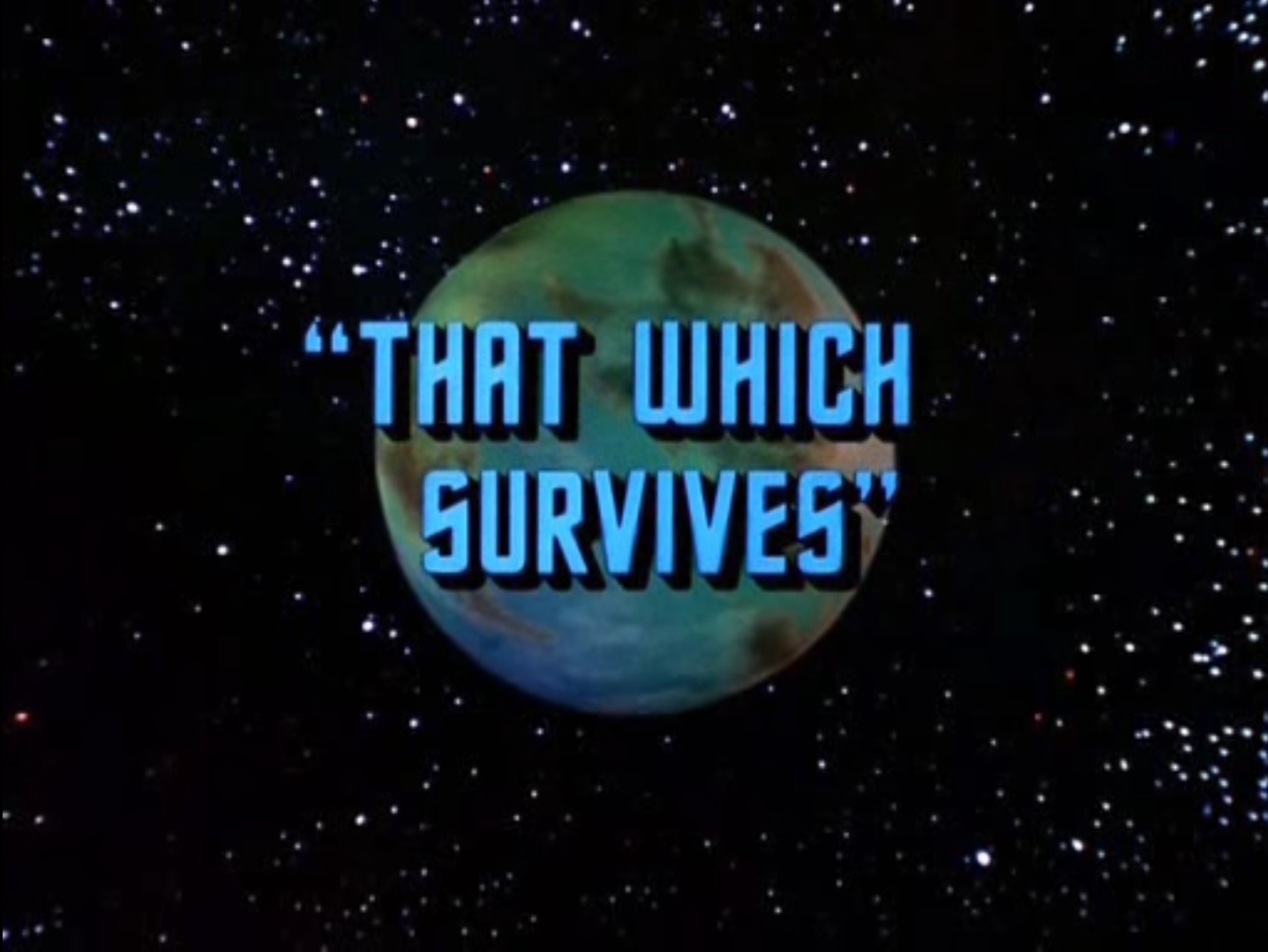
We begin with the Enterprise circling a newly discovered planet anomaly: it has an atmosphere and plant growth despite its young geologic age and small size. Kirk, McCoy, Sulu, and senior geologist D'Amato (an exciting new face—but don't get too attached) beam down to study the planet.
As they're being beamed, however, a mysterious woman (Losira, played by Lee Meriwether, lately of Time Tunnel) pops aboard and kills the transporter technician! The landing party makes it down anyway and ends up in the center of a vicious earthquake. The Enterprise experiences a similar tremor and is flung 990.7 light years from the planet.
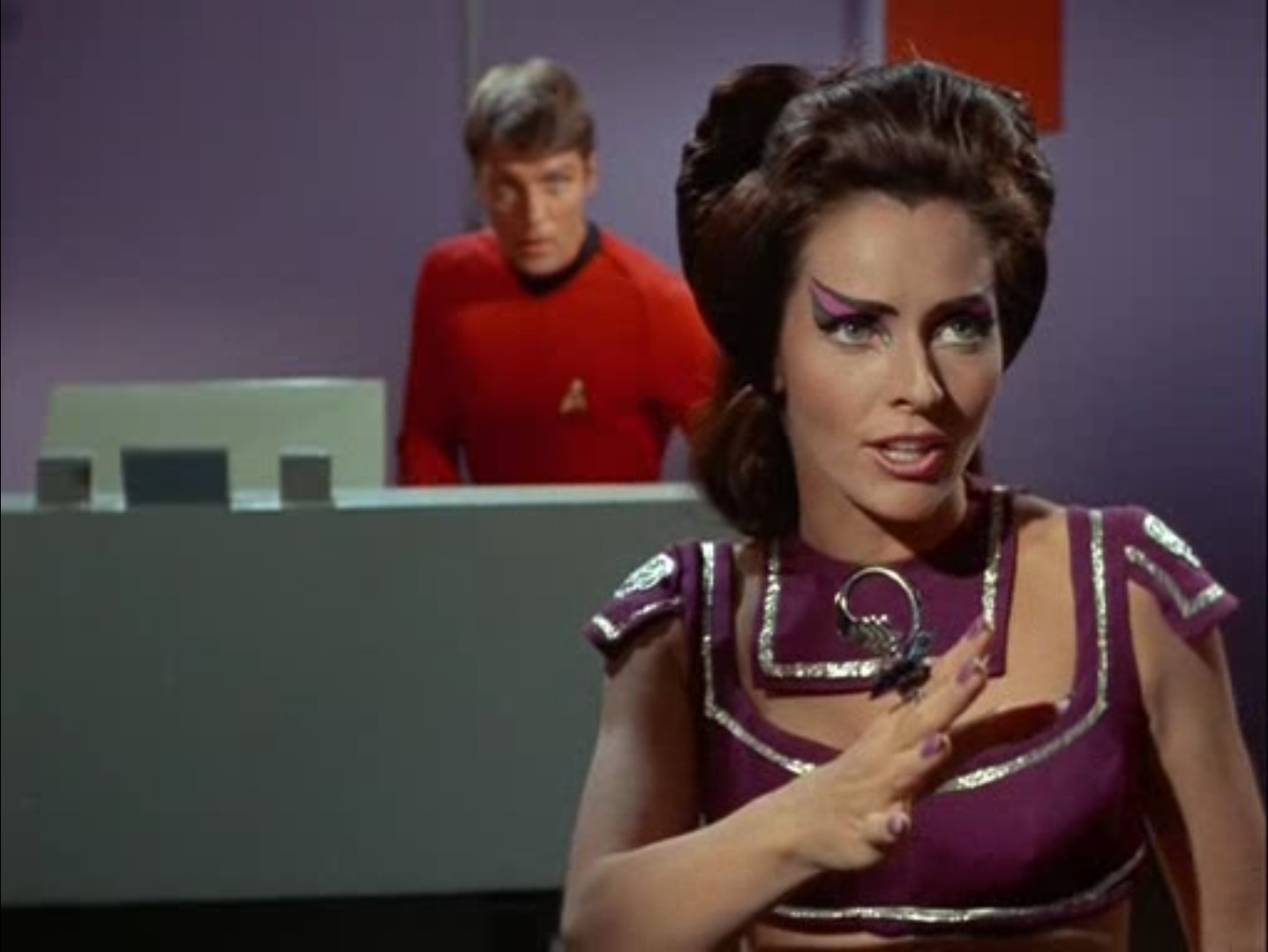
"Wait! Let's shake hands, first!"
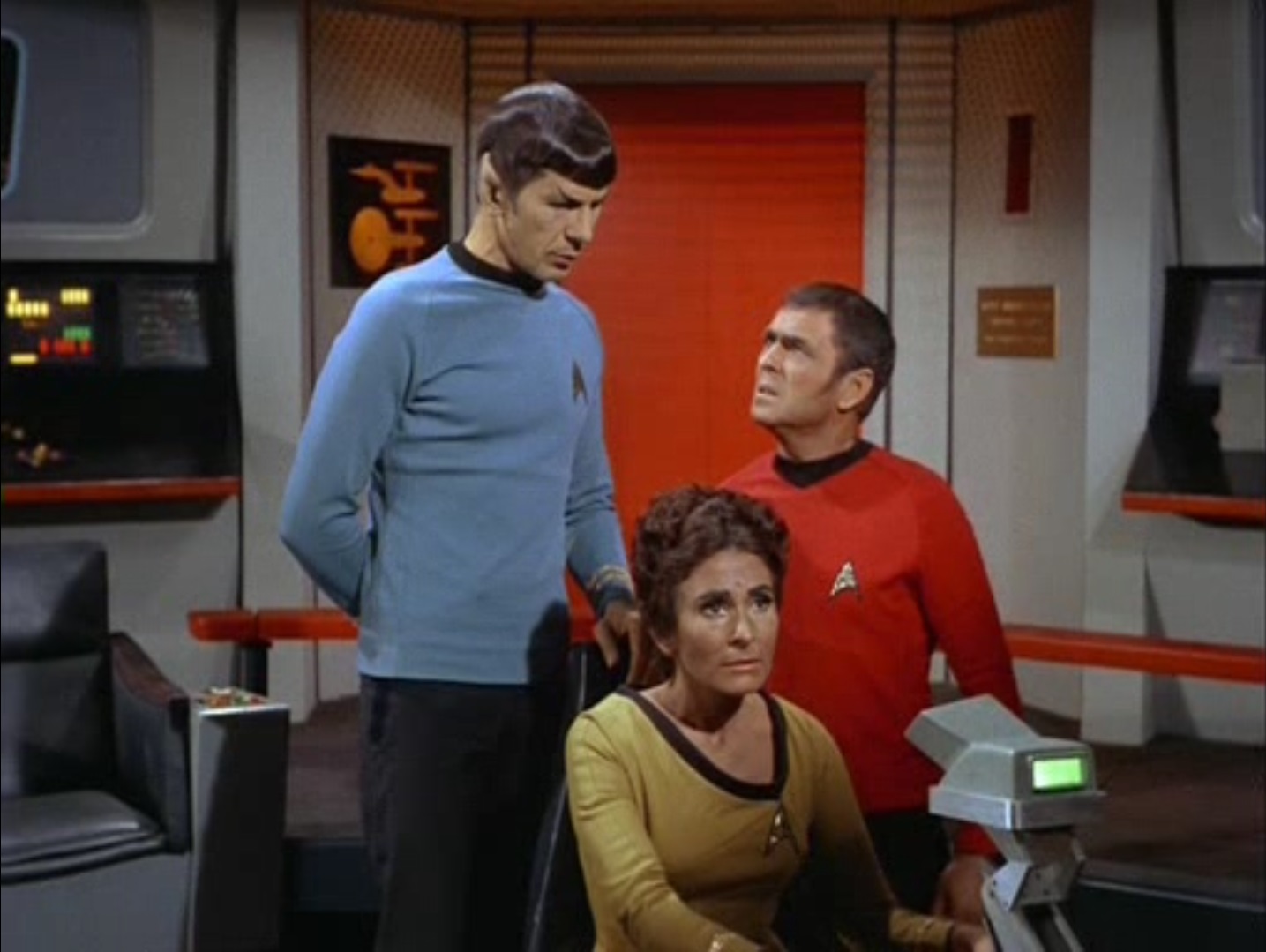
Spock is more concerned about rounding errors than the ship's current predicament, chastising Lt. Rahda for describing the distance as "1000 light years".
The landing party immediately began protocol for a survival situation after failing to detect or contact the Enterprise. Sulu and McCoy both pick up odd readings on their tricorders: "Like a door opening and closing." At the same moment, D'Amato sees a beautiful woman—the same one from the transporter room—who claims "she is for him" and tries to touch him. She succeeds, and he drops dead, every cell in his body disrupted. His corpse is soon discovered by the other three, but the woman is nowhere to be found.
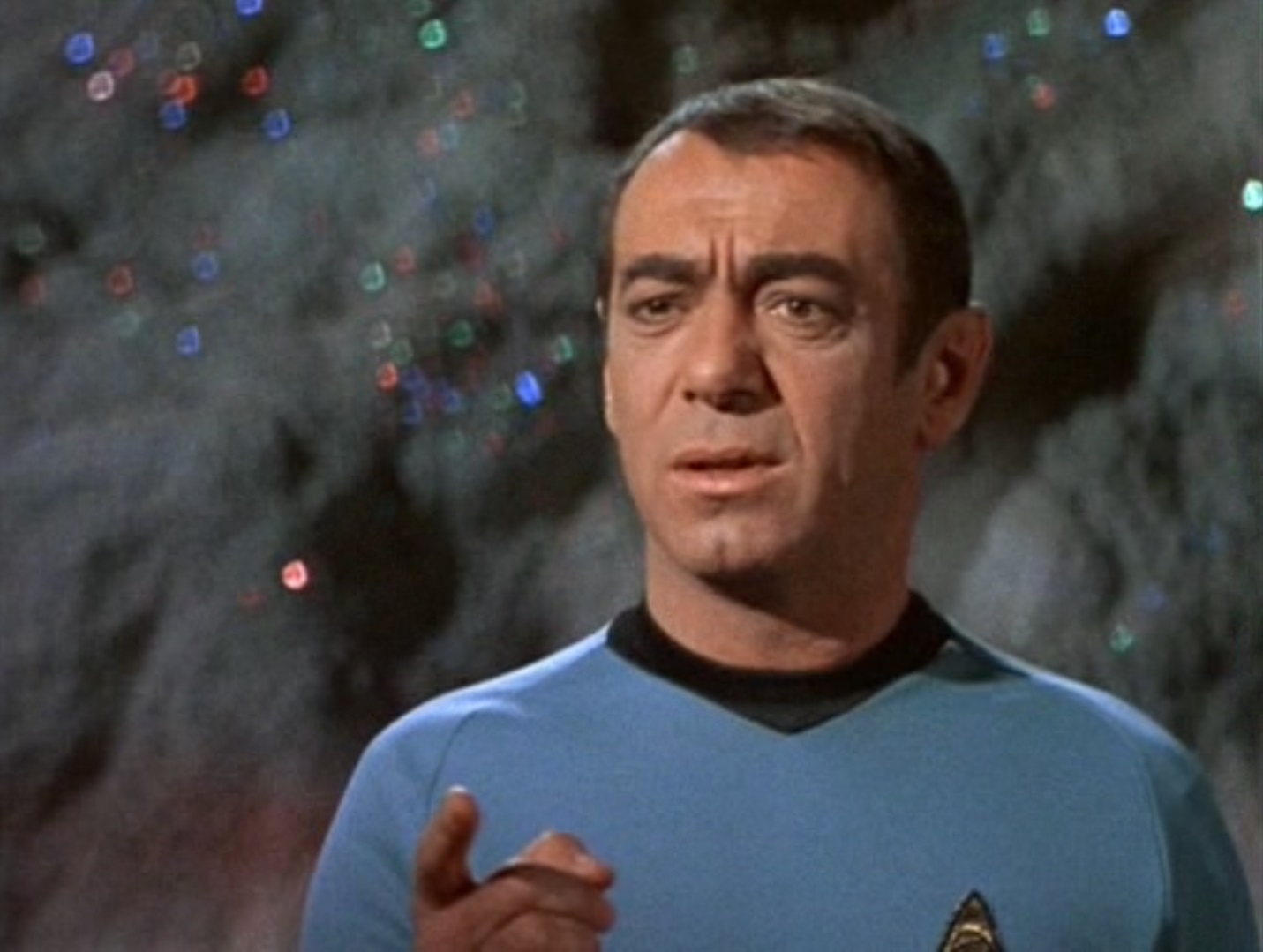
Arthur Batanides is both delighted not to be cast as a mook this week, and dismayed that he's about to die
While the landing party scenes are the most interesting part of the episode, not much more happens. The woman eventually reappears and tries to attack Sulu, but Kirk and McCoy intervene, discovering in the process that the woman can't hurt anyone but the person she is targeting. She disappears and reappears again, going after Kirk this time, but Sulu and McCoy successfully protect him. For no apparent reason other than a limited runtime, the three are then allowed access to the planet's defense control center, and they learn the truth of the mysterious woman. It turns out the original builders of the planetoid accidentally invented a disease which killed off their race thousands of years ago. The commander left behind a computer imprinted with her personality and programmed it to kill any intruder. Kirk manages to destroy the computer before it can kill them, and all is well. A fine solution, though rushed and poorly explored, the episode would have hung together alright…if the scenes on the Enterprise didn't destroy all meaning in it.
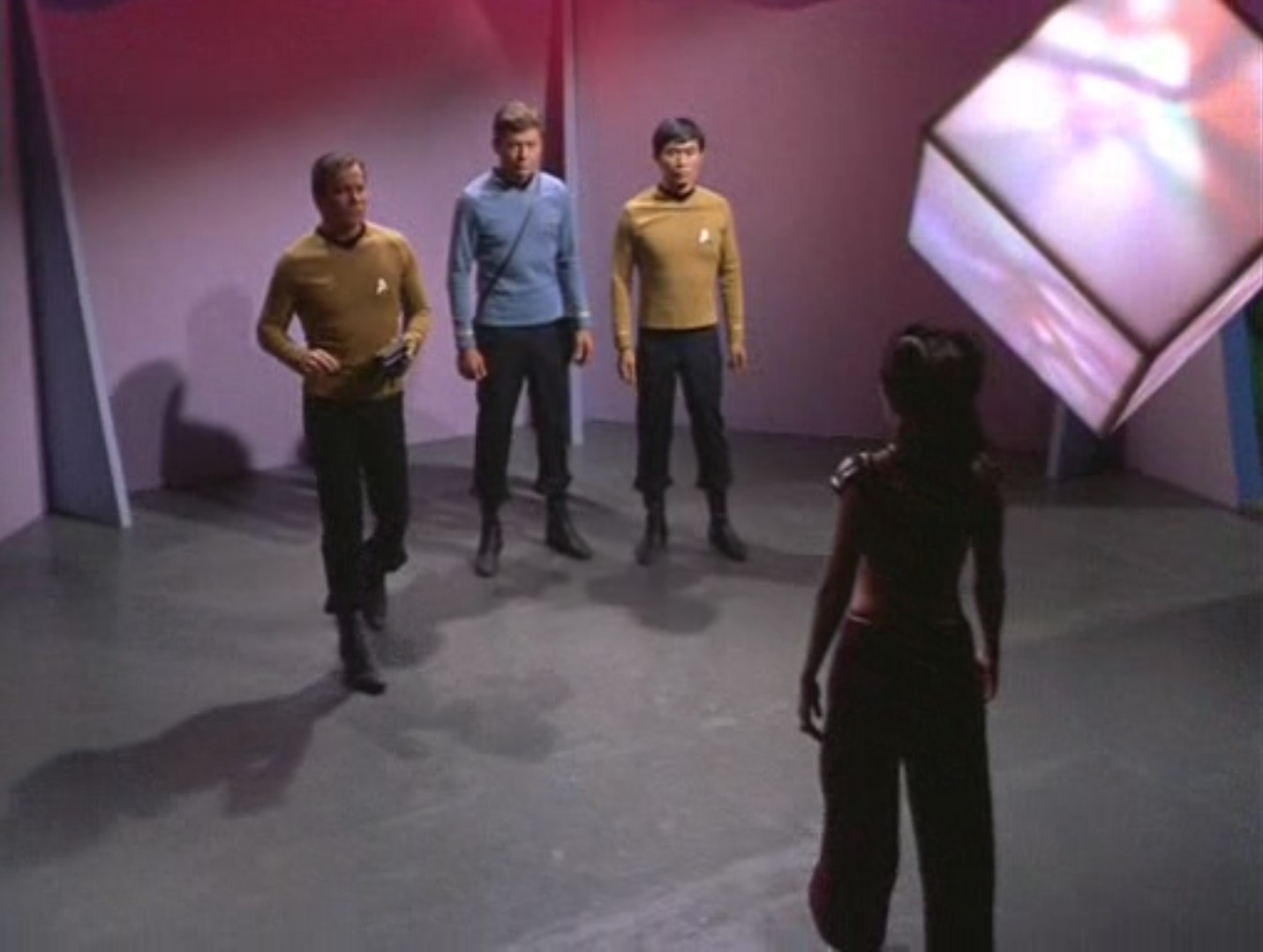
"Wait! Maybe I can talk it to death. It's worked with every computer before…"
Shortly after the Enterprise is flung 1000 light years away, the death-robot woman appears on the ship, is implied to read the mind of a technician, kills him, and sabotages the matter/anti-matter combustion tubes. This raises questions like:
"How did the woman travel so far from the planetoid?"
"Why did she bother to attack the ship when it was no longer anywhere near the planet? Isn't 1000 light years far enough away for the computer to no longer see the Enterprise as a threat?"
It would have made more sense if the ship had simply been damaged from teleporting (logical, since it was never explained how the feat was done) and Lee Meritwether's lost screen time could have been made up for on the planet with additional scenes of the landing party unraveling the mystery of the lost civilization.
I haven't even mentioned the terribly dull scenes of Scotty trying to save the Enterprise from a Losira-induced explosion. Every party of that sequence felt like an artificial addition to stretch runtime. To summarize, Spock tells Scotty how to do his job, Scotty hesitates, runs into some roadblocks, then finally, in the last ten seconds does the job and saves the Enterprise. That's it.
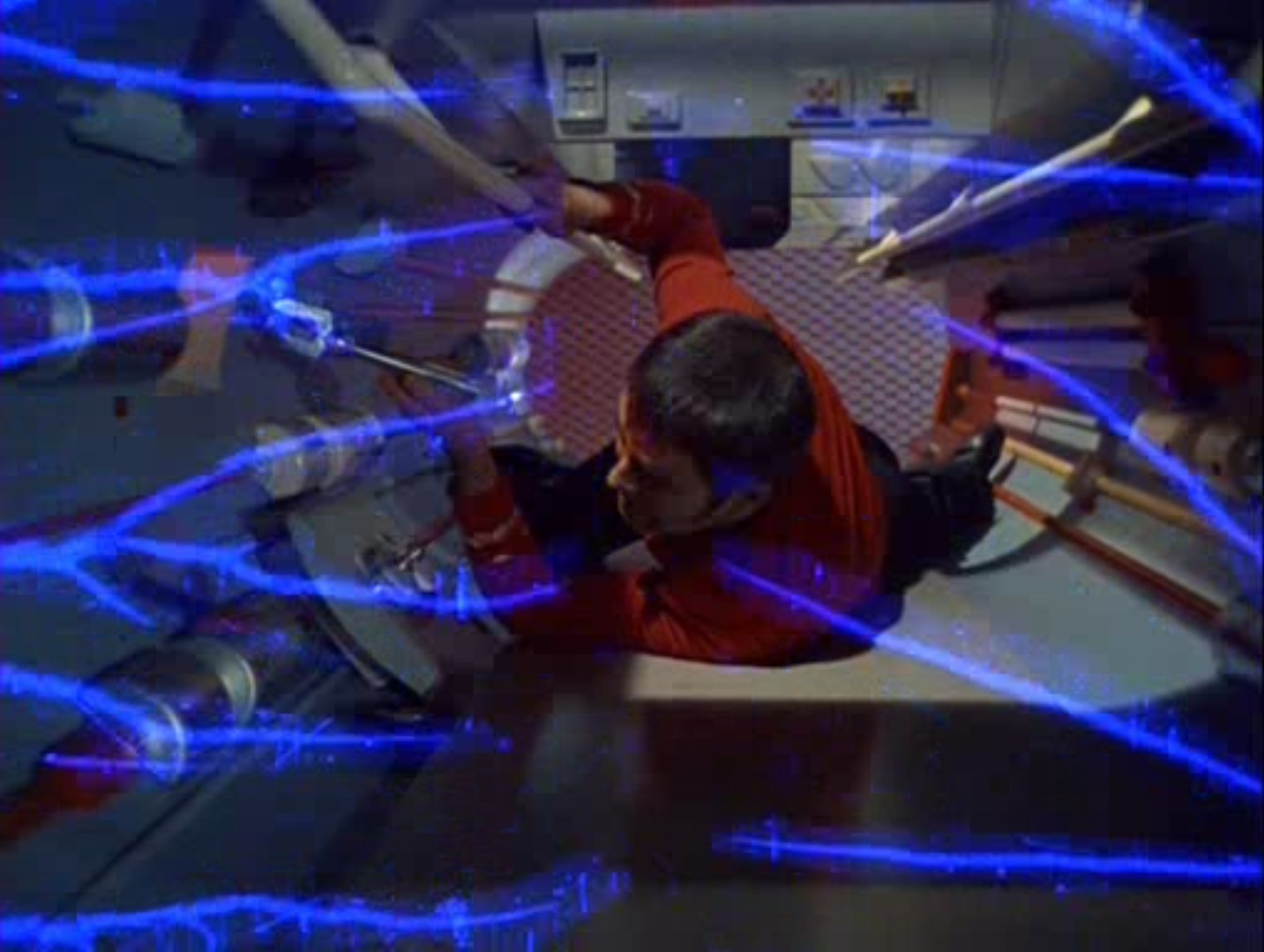
"I've found the leak, Mr. Spock! I canna change the laws of plumbing!"
Once again, this is an area that could have been improved with some minor changes. Instead of the whole ship blowing up, have it simply be stranded. The tension comes from whether Scotty can fix the ship in time without getting himself killed. Have Spock as a commander wrestling with whether to eject the pod Scotty's working in because a wire's accidentally been tripped and now the whole ship is at stake. That would have been compelling storytelling.
This episode had so much promise: the promise of another ancient civilization and 4-D beings (Losira's teleportation effect is genuinely neat), of new cool characters and cameos of old beloveds like Sulu and Dr. M'Benga, of survival plot interwoven with futuristic technology. Indeed, there were a lot of pieces to love.
But, like a robot who is only beautiful on the surface, the actual experience was less than pleasant. Three stars—2 for the episode, and 1 for Merriwether's great acting. Hopefully, next week will be better.

by Gideon Marcus
Full reverse!
Remember the execrable episode, "The Galileo Seven"? There, we were meant to believe that Spock had never held a command in his life, and when forced to lead just six stranded crew on a hostile planet, he kept tripping over the basic emotional needs of his human comrades.
Now recall "The Tholian Web", where a much-improved Spock handled Captain Kirk's presumed death with tact and even compassion, officiating a funeral, commiserating with McCoy, and generally earning the respect of his crew. Scotty even called him "Captain", in a tear-inducing moment.
Heck, just recall last week's "The Mark of Gideon". While in no wise a good episode, Spock carried out negotiations with Chairman Hodin with reserve and acumen. This was a man who could, when the need arose, handle the center seat without issue. And we know from "Court Martial" that people in blue shirts sometimes become starship captains…
This week, the Enterprise is imperiled, Spock's two best friends and the ship's Third Officer are missing and presumed dead, and yet the half-Vulcan pedantically harps on decimal points and the human compulsion to be thanked for carrying out their duties. He is a cold fish, inspiring no loyalty. He also never seems in much of a hurry to do…well…anything! It is absolutely inconsistent with his demeanor as acting-skipper established over the last two seasons. Moreover, it is inconsistent with his ever-deepening bond with Kirk and McCoy. The real Spock would be mad with worry…and covering it up with a stoic and efficient veneer, welding together a 430-man team whose sole purpose is to retrieve the distressed landing party.
But it was easier to write a caricature. As one of our guests last week noted, it was as if the episode had been written by someone who hated the characters and wanted to lampoon them.
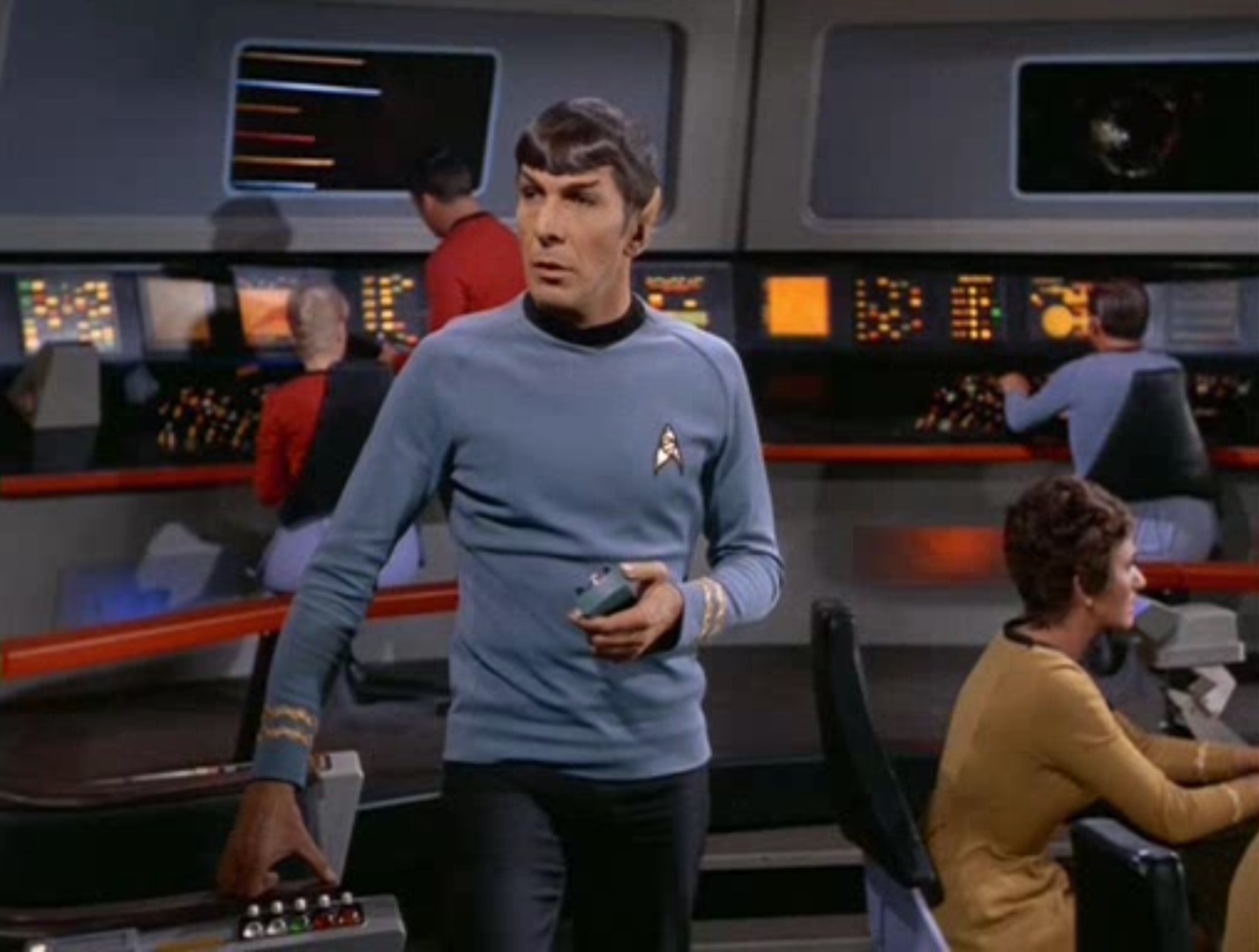
"Is it already time to harass someone else? Goodie!"
Then, of course, we get the egregious bit where it's Spock who tells Scotty how to fix the failed matter/antimatter regulator. As Joe Reid has noted many times, Kirk often gets the pleasure of being the smartest person in the room, suggesting solutions to folks who should be telling him how to solve problems. This time, Spock is the beneficiary of this irksome trend. At least in "The Doomsday Machine", Scotty is ahead of Kirk in the figuring out of things, and he beams admiringly at his captain as if at a promising student. In "That Which Survives", Scotty has considered and discarded Spock's solution—manually fixing the antimatter flow—as too dangerous. With no other solutions, what, exactly, is it more dangerous than?
Blech.
While we're at it, Kirk was quite the jerk to Sulu on the planet. Perhaps this was because he was distraught from the potential loss of the love of his life (the Enterprise), but at least he could have said he was sorry, as he has done in every other instance where he has snapped at crew under tension.
2.5 stars.

by Janice L. Newman
Slivers of Silver
While I agree with my esteemed co-writers about the poor characterization and plot holes in this episode, there were some good new special effects that I don’t recall seeing before.
I always enjoy looking at the props, especially after having read the interview with the man responsible for creating them in one of the many fanzines. The blue-tipped grass on the planet was pretty and interesting, giving it a slightly alien feel. The effects with Losira disappearing by seeming to fold up into a black line were new and intriguing. When Scotty went to fix the broken warp engine, a neat ‘blue lightning’ effect made a barrier across the tube. The flickering red and green lights on his face, though a bit headache-inducing to watch, also aided the illusion and increased the tension of the scene.
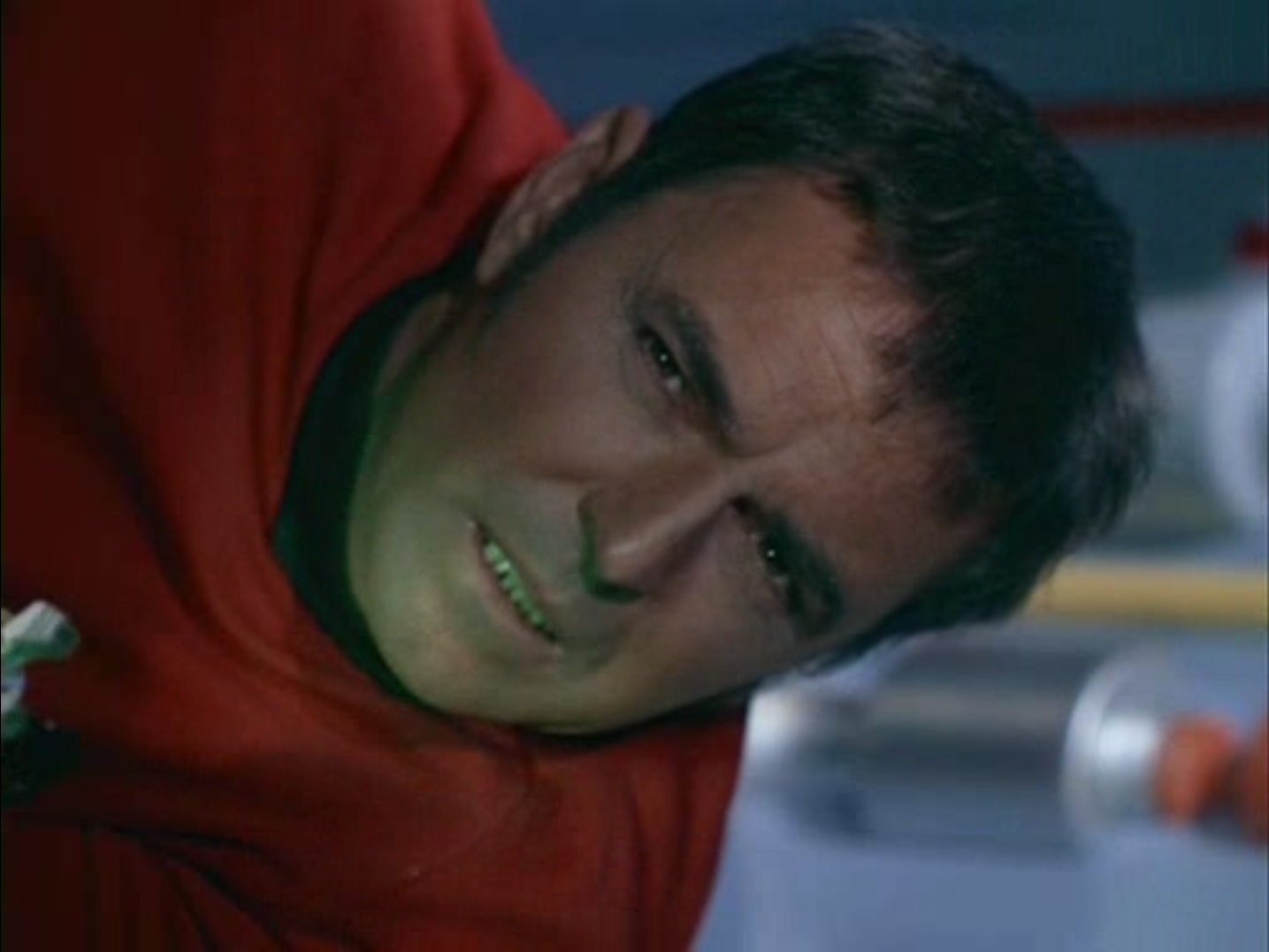
"There's your problem, Mr. Spock—a green gel light!"
Losira’s costume was cleverly-designed, but felt strange and wrong for her role. Several of my friends commented on the fact that she didn’t look at all like the head of a distant outpost whose members had just been killed off by a plague. With the cutouts in her shirt and her elaborate hairdo and makeup, she did not have much of a ‘last survivor’ or ‘hearty commander’ feeling. Of course, there is nothing wrong with being feminine, and for all we know she may have dressed up in her race’s version of formal wear before giving her final report. Still, it clashed uncomfortably with the plot for many of us, even if the seamstresses among us were mentally trying to figure out how to re-create the look.
Unfortunately, well-done effects cannot carry a story, and, while the episode was mildly-engaging, it didn’t leave much of an impression. Two stars.
Are There Men on This Planet?

by Mx. Blue Cathey-Thiele
I was not the only viewer disappointed by some stand-out moments which highlighted that, progressive though Star Trek is, it still has weak spots. In particular this week: sexism. Losira is a replica of a commander, the last survivor of a disease-struck station. Her costume, while intriguing in design, conveyed none of that. Sulu comments when first threatened that he “doesn't want to shoot a woman.” As chivalrous as the helmsman is, by the time of starships and alien worlds, I would hope that humans no longer treat women differently than men, deadly touch or not. And then too, the repeated focus on beauty. A storm can be beautiful and deadly, but observing a force of nature is not the same as McCoy, Sulu, and Kirk making a point to comment on how Losira looks. These are the same crew who get excited about flying into the heart of a giant amoeba or historical facts from centuries past. After all they experienced on this not-a-planet, it seems improbable to focus on whether or not they found an alien woman attractive. As explorers and scientists, why not marvel at the mysterious botanical and geological feats, the design of the defense system, or the fact that that defense system was able to send the Enterprise through a molecular transporter and 990.7 light years away! Or wonder why a defense system would be calibrated to perfectly match a target, and seemed as equally focused on unifying as destroying?
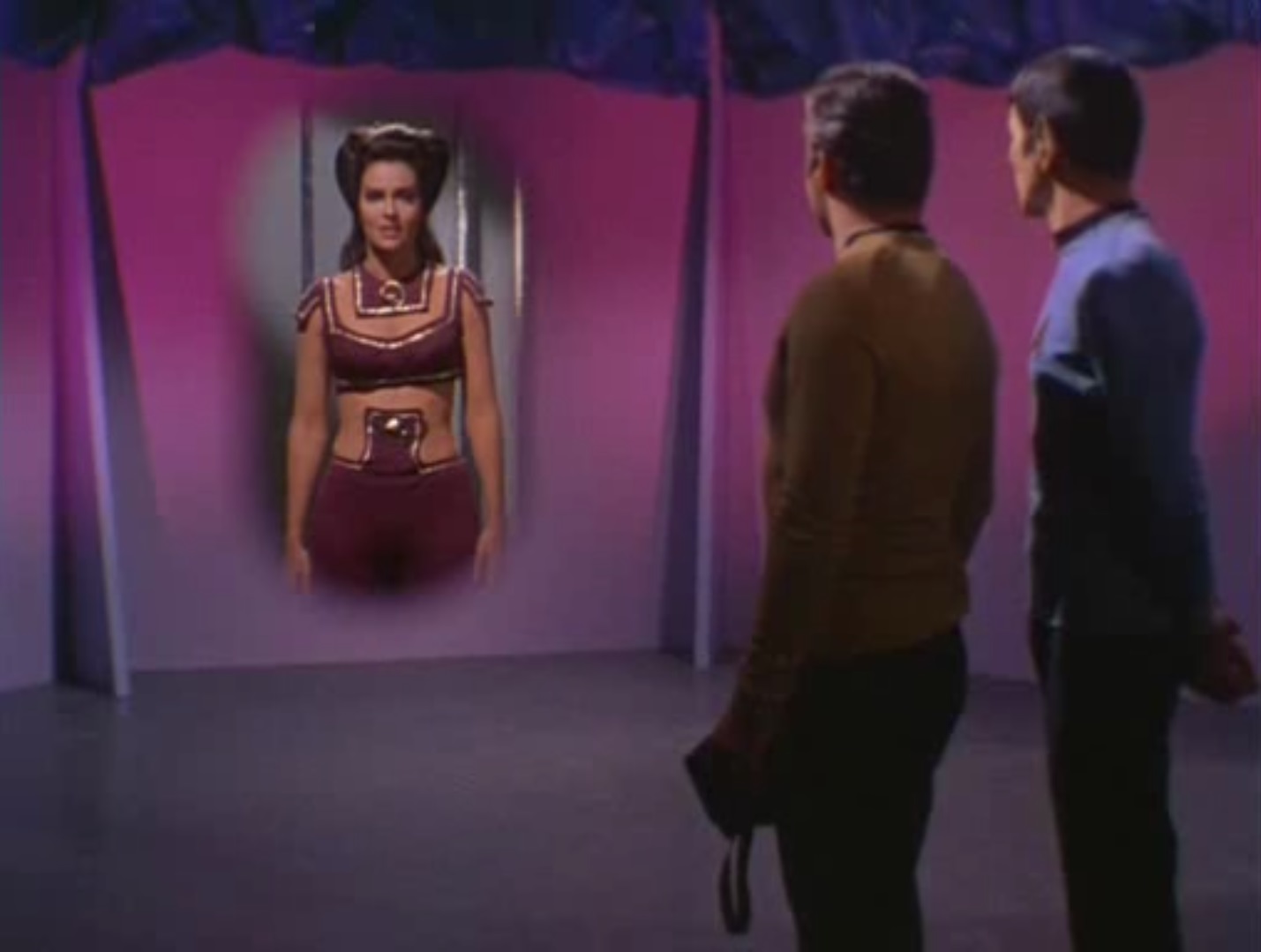
(sings) "What intrigues a man about a woman is elusive…"
Despite the flaws, and feeling put off by the attitude of the men, I still enjoyed the episode. Characters had time to share the spotlight and pull on threads from previous episodes. I love seeing the crew operate the Enterprise when the Captain is away, and how different officers handle command. Lt. Rahda did a fine job as helmsman, and it was nice to have Dr. M'Benga return to the screen. Logically, a ship this size must have multiple doctors, but this episode confirmed that a minimum of three were present, despite us usually only seeing McCoy and Nurse Chapel. (Maybe the ship could spare one to give Spock a check-up after that bump to his head.) I also noted Kirk's persistent focus on supplies—he brought up the need for food and water at least four times—which may have been in part due to his experience on Tarsus IV, which started with a crop blight: something that is bound to leave a lasting impression regardless of whether he talks about it.
The overarching plot was lacking, and I would have liked to have gotten more explanation or simply explanation spaced out better. However as an episode among a larger story, it gave us a great look at the workings of my favorite starship and crew.
3.5 stars
[Come join us tonight (January 31st) for the next thrilling episode of Star Trek! KGJ is broadcasting the show live with commercials and accompanied by trekzine readings at 8pm Eastern and Pacific. You won't want to miss it…]

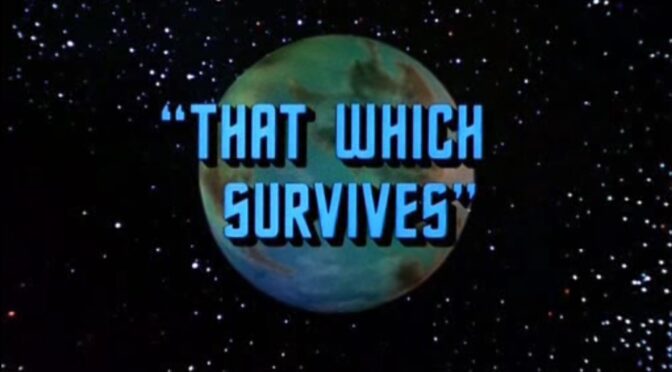



I've heard it said in baseball that the worst thing a player can have is potential, because that means he's not playing to the best of his ability. That really applies to the last few episodes of this show.
I think I come in around three stars on this one, but they're very disappointed stars. Despite the bad writing for Spock, the bits aboard the Enterprise were the best part for me (making it two weeks in a row where aboard ship without Kirk is more interesting than whatever he's doing elsewhere). We got a look at crew we never see, but have to be there. Extra doctors, Lt. Radha, more than just nameless extras walking through a corridor, warming a seat for Sulu or Chekov, or dying to give us a sense of the stakes.
Still, I don't want to say too many nice things about it. I'm pretty sure that if this one comes around in reruns, my response will be, "I am for… changing the channel."
My field notes….
Wig Trek: lavish
Cave Trek: yes, as I recall
Fog Trek: no
Doinnggg Trek: no
Love Trek: surprisingly, no
Relevance Trek: no
It was a little bit surprising, given the way the series is running lately, that Lover Boy Kirk didn't romance Losira, causing smoke to come out of her wig as she felt the conflict between duty and passion. Well, we can be glad of that at least.
Another low-budget show. The soundstage look is overly familiar for viewers. We’ve seen some distractingly bad makeup around eyes this season & we sure do with this one. Doesn’t Losira look like a circus performer? — like she would be right at home vaulting over horses &c?
This wasn’t an outright bad teleplay, but was certainly one for which the viewer had to extend a lot of good will, make much allowance. There’s little sense in what we actually have, of the eeriness that might have been possible if the show had had a larger budget and the direction had been a lot more interesting.
I guess I'm in the minority.
I thought "That Which Survives" was one of the best episodes of season 3.
It's not often that we get to see Scotty risk his life to save the day.
They could have ejected the warp drive pod thing that Scotty was in at the end, but it would have disabled the ship and left the landing party abandoned.
To me, it's more fun to watch Scotty & Spock disagree over a solution. Much more realistic as well, as Engineers and Scientists seldom see eye to eye in the real world.
To each his own.